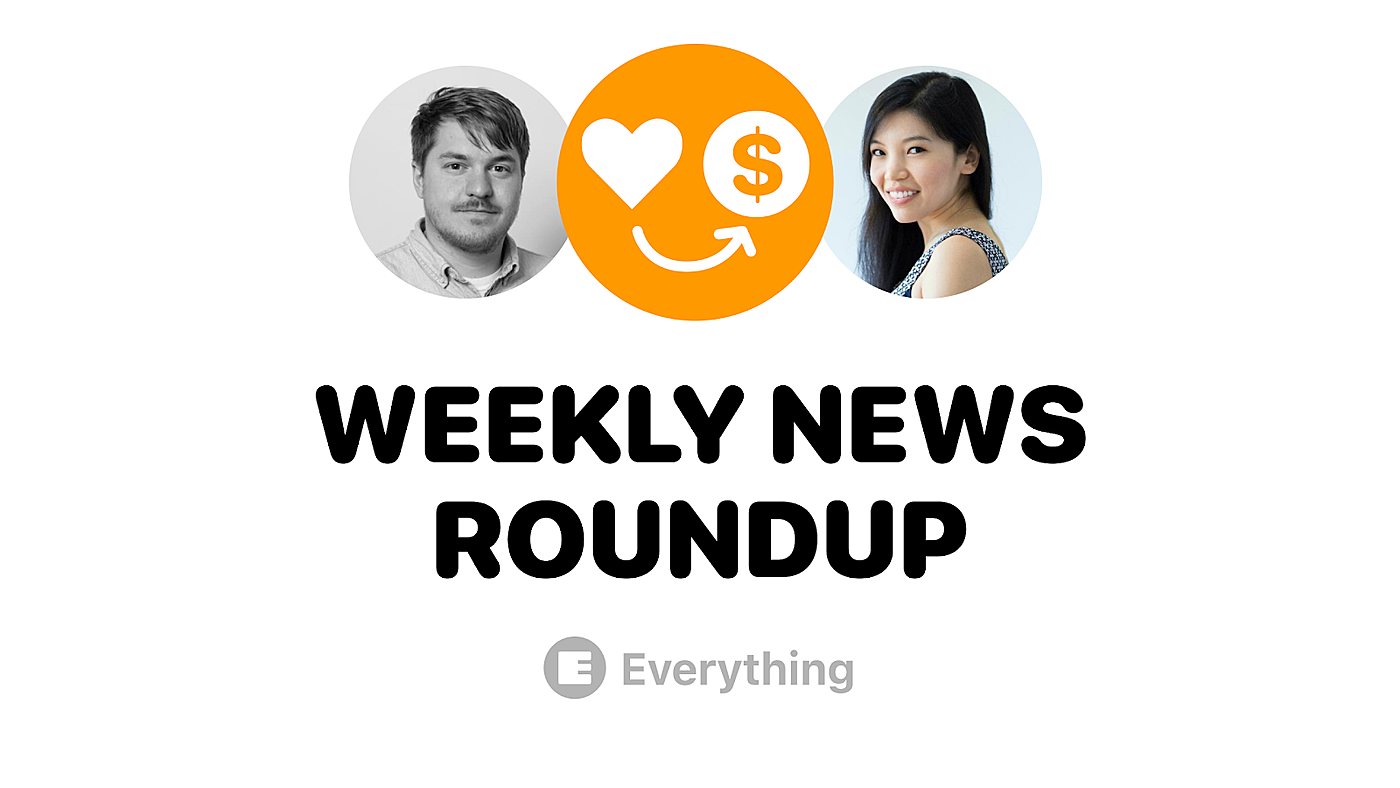
Welcome to the inaugural issue of the Means of Creation weekly news roundup where we break down the latest news on the passion economy — platforms, creators, startups, and trends.
The first month of the Weekly News Roundup will be a free beta, so we are looking for your feedback! We want to make this the most helpful resource for founders, investors and creators in the passion economy and we welcome all feedback (form also linked at the bottom). Let’s get into it.
Stuff We Published
In case you wanted to catch up on any of the past Means of Creation episodes, we’ve posted them on YouTube! Here are a few of our most popular ones:
- Blake Robbins on the future of media, Twitch, OnlyFans, and creator monetization (YouTube)
- Polina Marinova on The Profile, being an independent writer, and changes in the media industry (YouTube)
- Greg Isenberg on unbundling consumer social networks, and the state of online communities in 2020 (YouTube)
View more episodes at the Means of Creation YouTube Channel.
Top of Mind
TIKTOK
ByteDance says it will keep control of TikTok under deal with Oracle // New York Post
After months of waffling and uncertainty (is it here to stay, is it not?), it turns out that the TikTok deal will go through, and the app won’t be banned in the US. ByteDance will retain 80% control while Oracle will buy 12.5% and Walmart will own 7.5% that values TikTok around $60 billion. In this deal, Oracle will be able to access the TikTok “source code” to ensure that the American data is secure.
However, this story is evolving by the hour. Over the weekend, Trump said that the US will have “total control” and implied a majority ownership for American companies. If you add the investment by American-based investors (including Sequoia, General Atlantic and Tiger Management) to the 20% owned by Oracle and Walmart, the combined stake would be worth 53% of the firm. US citizens will also occupy four of five TikTok board seats.
As part of the deal, Trump said that the companies also agreed to pledge $5 billion to an education fund that will be directed toward teaching American children “the real history of our country.” However, there are concerns over this as well. ByteDance first heard about the fund from news outlets, and the fund has Democrats concerned. “[The] proposed “1776 Commission” has alarmed many Democrats, who fear the president is seeking to diminish or obscure the role of slavery in U.S. history.”
One of the most interesting parts of this entire saga (as well as earlier events this year, like the shutdown of Mixer) is how much it has boosted awareness among creators of the importance of having direct access to one’s audience, and that one can be de-platformed not just by a company, but by a country. Concerns around platform risk have led to products such as Community, RIP.FYP, as well as more broadly to companies like Linktree that help creators shift audience attention to other platforms. In coming years, we anticipate that the question of how to truly own one’s audience and mitigate platform risk will become more top-of-mind for creators.
CREATOR ECONOMY FINANCING
A Creative’s Subscription Revenue: Can you lend against it? // Connor Hale, Medium
A new three part series about the creator economy was published on Medium exploring the idea of underwriting debt using the cash flows from creator subscription revenue.
In new media, the individual creator is the atomic unit of value, not the media company. However, financing mechanisms haven’t caught up to this new reality. Creators are the new small businesses, and they have similar capital requirements: subscriber acquisition (marketing), hiring freelancers (human resources), paying for tools to help create higher quality content (operations). Could the subscription revenue from a newsletter be stable enough to lend against? Also see Part 2 and Part 3.
Relatedly, Patreon announced Patreon Capital, its merchant cash advance initiative, earlier this year, wherein they give micro-loans to creators on the basis of their subscriber growth and recurring earnings.
ONLYFANS
The INSANE story of How OnlyFans changed P*rn // F*ckonomics
A few weeks ago, this video was published that breaks down how NSFW content creation has changed with the rise of OnlyFans. It’s worth your time.
For years, pornographic actors were underpaid. The industry was consolidated and top actors sometimes received only $1,000 for a video that had millions of views. Actors sometimes hacked together other tools like Venmo and Snap to monetize users directly, but those platforms typically shut them down. OnlyFans came along and made it possible for these actors to earn money directly from their fans. This video explores the dynamics of paying for NSFW content on OnlyFans - specifically around commoditizing intimacy and the “girlfriend experience.”
In one interesting screencap of this video (13:08), we see that 68% of a creator’s income comes from pay-per-view messages, with the remainder coming from subscriptions--in other words, the superfans who are paying to view creator messages are driving the majority of creator earnings.
Related: Onlyfans Stars Say Tiktok Is Making Them Rich // The Verge
TikTok and OnlyFans have a symbiotic relationship. Many creators amass an audience via TikTok’s algorithm on the “For You” page, and then point followers to their OnlyFans where they can subscribe for more content. Some creators have seen wild success using this system: “Five months and one viral video later, Lee says she’s making anywhere from $110,000 to $200,000 a month.” However, the approach is risky since TikTok often deletes their accounts and videos that “commits, promotes, or glorifies sexual solicitation or sexual objectification.”
This symbiotic relationship is also reminiscent of the relationship that many other monetization tools have with social networks and discovery platforms. For instance, Substack has been called “Twitter’s paywall,” given that writers often leverage Twitter for growing their free audience before upselling them to a paid newsletter. It’s common for creators to leverage social platforms with an algorithmic feed to increase their reach, then direct them to a different platform for monetization.
https://twitter.com/nbashaw/status/1276222705386131456
ARTIST MONETIZATION
How Can We Pay for Creativity in the Digital Age? // The New Yorker
While few artists create in order to make money (usually quite the opposite), many struggle in the digital age as they work through “the overlapping trio of self-marketing, self-promotion, and self-branding.” This excellent article in The New Yorker discusses the history of art and how the internet’s promise to free the artist has played out (and how it differs across music, film and other creative fields). Supporting reading: The Death of the Artist by William Deresiewicz.
ICYMI:
Find Substack newsletters from people you follow on Twitter // Substack
- Substack makes their first explicit connection to Twitter by allowing you to find Substack newsletters based on who you follow on Twitter.
Two Part Podcast on the Creator Economy // Andreessen Horowitz (Podcast)
- The first episode is about practical tips for making it as a solo paid newsletter writer from four successful Substack writers, while the second episode discusses new potential revenue streams enabled by emerging decentralized technology such as cryptocurrencies.
Kevin Systrom (Co-Founder of Instagram) rumored to be TikTok’s next CEO // NY Times via Alex Kantrowitz
- Kevin Systrom rumored to be TikTok’s next CEO. We think he’d be a great fit.
How To Start and Grow a Podcast with David Perrell, Jeff Umbro, and Sachit Gupta // Venture Stories (Podcast)
- A trio of podcast veterans share their best tips for finding an audience, asking good questions, and their request for podcasts.
Dan Shipper & Nathan Baschez on Building Everything // A Media Operator (Podcast)
- Our own Nathan Baschez and Dan Shipper talks with Jacob Cohen Donnelly about starting a media company, bundle economics and the incentives of writers.
Thanks for reading! Let us know what you think, and see you on Friday for our next interview.
How did you feel about this post?
Forwarded from a friend? Sign up for Means of Creation! It includes:
- The Means of Creation talk show every Friday at 11:00am PST / 2:00pm EST featuring founders and investors in the passion economy. Recent guests include Blake Robbins, Polina Marinova and Visakan Veerasamy.
- Passion Economy News (you’re reading it now!) where we break down the latest news on the passion economy — platforms, creators, startups, and trends. This is currently in beta, but next month it will be for premium members only.
- Everything else in the bundle, including great stuff from Divinations (on strategy) Superorganizers (on productivity), Napkin Math (on investing), and Praxis (from the inimitable mind of Tiago Forte). And we’re adding new stuff all the time!
The Only Subscription
You Need to
Stay at the
Edge of AI
The essential toolkit for those shaping the future
"This might be the best value you
can get from an AI subscription."
- Jay S.
Join 100,000+ leaders, builders, and innovators

Email address
Already have an account? Sign in
What is included in a subscription?
Daily insights from AI pioneers + early access to powerful AI tools








Comments
Don't have an account? Sign up!